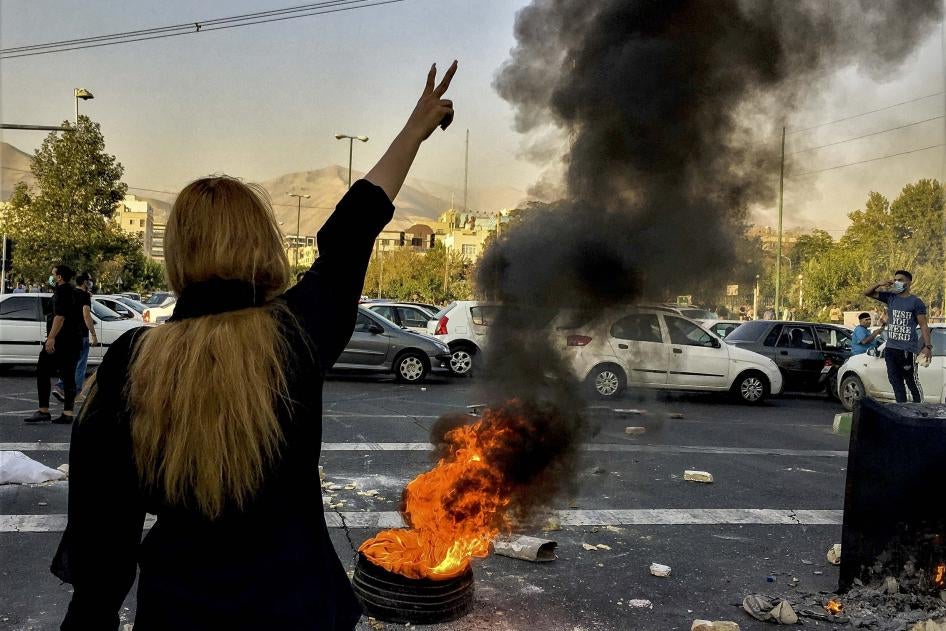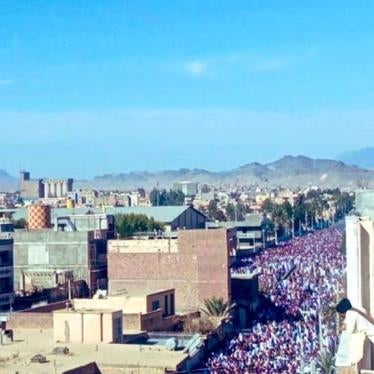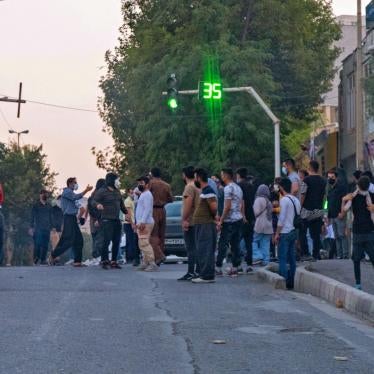(Beirut) – Iranian authorities used excessive and lethal force in their clampdown on nationwide protests that broke out in September 2022, Human Rights Watch said today in its World Report 2023. The government imprisoned hundreds of activists on dubious charges, and issued death sentences in grossly unfair trials.
The death on September 16 of Mahsa (Jina) Amini, a 22-year-old Kurdish woman from Sanandaj in western Iran, in the custody of the morality police after being arrested for an “improper” hijab, sparked demonstrations across the country, including in schools and universities. Human Rights Watch documented security forces using shotguns, assault rifles, and handguns against protesters, in largely peaceful and often crowded settings. As of November 14, human rights groups were investigating the reported deaths of at least 341 protestors, including 52 children.
“With mass repression, unfree elections, and apparent corruption and mismanagement, Iran’s autocracy rules with all that remains: brute force,” said Tara Sepehri Far, senior Iran researcher at Human Rights Watch. “Other countries, including from the Global South, should increase pressure on these brutal authorities and ensure there is accountability for their crimes.”
In the 712-page World Report 2023, its 33rd edition, Human Rights Watch reviews human rights practices in close to 100 countries. In her introductory essay, acting Executive Director Tirana Hassan says that in a world in which power has shifted, it is no longer possible to rely on a small group of mostly Global North governments to defend human rights. The world’s mobilization around Russia’s war in Ukraine reminds us of the extraordinary potential when governments realize their human rights obligations on a global scale. The responsibility is on individual countries, big and small, to apply a human rights framework to their policies, and then work together to protect and promote human rights.
Iranian authorities have arrested more than 15,000 protesters, detaining thousands of them in overcrowded prisons and depriving them of their due process rights. These include hundreds of human rights defenders, activists, journalists, and lawyers arrested for their peaceful dissent or support of the protests. The authorities also confiscated passports and placed travel bans on dozens of public figures, including actors and athletes. Human Rights Watch has previously documented the use of torture and mistreatment in detention, including sexual harassment against detainees.
As of November 21, at least 21 people were facing charges of “enmity against God” (Moharebeh) and “corruption on earth” (Ifsad fil Arz) in connection to protests, which can carry the death penalty, Amnesty International has reported. Courts of first instance have issued at least six death sentences on these charges in trials that fall grossly short of international standards.
As of January 5, the Iranian authorities have executed two men based on charges of alleged killing and injuring of security forces, “using a weapon to spread terror,” and “disrupting society’s order and safety” in connection to the protests following grossly unfair trials. Several more detained protestors are at imminent risk.
Iranian courts, and particularly revolutionary courts, regularly fall far short of providing fair trials and use confessions often coerced under torture as evidence in court. Authorities have failed to meaningfully investigate numerous allegations of torture against detainees and routinely restrict detainees’ access to legal counsel, particularly during the initial investigation period.
Earlier in 2022, labor union strikes and ongoing protests against rising prices escalated and were also met with force. According to the Human Rights Activists News Agency (HRANA), between May 2021 and May 2022, over 69 workers’ rights activists were arrested, dozens more had been summoned for interrogations, and many had been subjected to violence and torture. The authorities have shown no willingness to investigate serious human rights violations committed under their control.
The United Nations special rapporteur on human rights in Iran, in his July 2022 report to the General Assembly, also raised concerns over the increase in drug-related executions. According to rights groups, 306 executions have been documented since the Iranian New Year on March 21, 130 of them for drug-related charges and 151 of them based on the Islamic principle of qisas, or “retribution in kind” punishments.
Women in Iran face discrimination in personal status matters related to marriage, divorce, inheritance, and decisions relating to children. While cases of femicide are increasingly reported in media and social media, Iran has no law on domestic violence to prevent abuse and protect survivors.
The government also discriminates against religious minorities, including Baha’is and Sunni Muslims, and restricts cultural and political activities among the country’s Azeri, Kurdish, Arab, and Baluch ethnic minorities. Authorities arrested and prosecuted members of the Baha’i faith on vague national security charges and closed businesses owned by them, as well as continued their crackdown against Kurdish political activists.
On November 24, members of the UN Human Rights Council voted to establish a fact-finding mission to thoroughly and independently investigate alleged human rights violations in Iran related to the protests, collect, consolidate, and analyze evidence of such violations, and preserve evidence, including in view of cooperation in any future legal proceedings.









